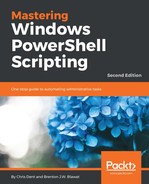Calling a method on an existing instance of an object found using Get-WmiObject is similar to any .NET method call.
The following example gets and restarts the DNS Client service. The following operation requires administrative access:
$service = Get-WmiObject Win32_Service -Filter "DisplayName='DNS Client'" $service.StopService() # Call the StopService method $service.StartService()# Call the StartService method
The WMI class can be used to find details of a method, for example, the Create method of Win32_Share:
PS> (Get-WmiObject Win32_Share -List).Methods['Create']
Name : Create
InParameters : System.Management.ManagementBaseObject
OutParameters : System.Management.ManagementBaseObject
Origin : Win32_Share
Qualifiers : {Constructor, Implemented, MappingStrings, Static}
Where the Invoke-CimMethod command accepts a hashtable, the Invoke-WmiMethod command expects arguments to be passed as an array in a specific order. The order can be retrieved by using the GetMethodParameters method of the WMI class:
PS> (Get-WmiObject Win32_Share -List).GetMethodParameters('Create')
__GENUS : 2
__CLASS : __PARAMETERS
__SUPERCLASS :
__DYNASTY : __PARAMETERS
__RELPATH :
__PROPERTY_COUNT : 7
__DERIVATION : {}
__SERVER :
__NAMESPACE :
__PATH :
Access :
Description :
MaximumAllowed :
Name :
Password :
Path :
Type :
PSComputerName :
To create a share, the argument list must therefore contain an argument for Access, then Description, then MaximumAllowed, and so on. If the argument is optional, it can be set to null; however, PowerShell is unable to say which are mandatory, so a trip to the MSDN is required:
https://msdn.microsoft.com/en-us/library/aa389393(v=vs.85).aspx
Having established that Path, Name, and Type are mandatory, an array of arguments can be created in the order described by GetMethodParameters:
$argumentList = $null, # Access
$null, # Description
$null, # MaximumAllowed
'Share1', # Name
$null, # Password
'C:TempShare1', # Path
0 # Type (Disk Drive)
Invoke-WmiMethod Win32_Share -Name Create -ArgumentList $argumentList
The return value describes the result of the operation; a ReturnValue of 0 indicates success. As this operation requires administrator privileges (run as administrator), a return value of 2 is used to indicate it was run without sufficient rights.
Adding the ComputerName parameter to Invoke-WmiMethod will create a share on a remote machine.
This method of supplying arguments to execute a method is difficult to work with for any but the simplest of methods. An alternative is to use the .NET method InvokeMethod on the class object:
$class = Get-WmiObject Win32_Share -List
$inParams = $class.GetMethodParameters('Create')
$inParams.Name = 'Share1'
$inParams.Path = 'C:TempShare1'
$inParams.Type = 0
$return = $class.InvokeMethod('Create', $inParams, $null)
The last argument, set to null here, is InvokeMethodOptions, which is most often used to define a timeout for the operation. Doing so is beyond the scope of this chapter.
To create a share on a remote computer, use the ComputerName parameter with Get-WmiObject.
